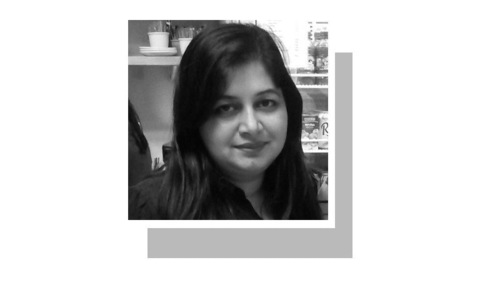 LONDON: He is possibly the cleverest person on the planet: an enigmatic and reclusive genius who shocked the academic world with his claim to have solved one of the hardest problems in maths. He is tipped to win a “maths Nobel” for his work on possible shapes of the universe. But rumours are rife that the brilliant Russian mathematician will spurn the greatest accolade his peers can bestow.
LONDON: He is possibly the cleverest person on the planet: an enigmatic and reclusive genius who shocked the academic world with his claim to have solved one of the hardest problems in maths. He is tipped to win a “maths Nobel” for his work on possible shapes of the universe. But rumours are rife that the brilliant Russian mathematician will spurn the greatest accolade his peers can bestow.
Since Grigory “Grisha” Perelman revealed his solution in 2002 to a century-old maths problem, it has been subjected to unparalleled scrutiny by the best academic minds. But no one has been able to find a mistake and there is a growing consensus that he has cracked the problem.
So, on Tuesday he is tipped to win a Fields medal. But even by the standards of troubled maths virtuosos such as John Nash, portrayed in the film A Beautiful Mind, Dr Perelman is described as “unconventional”. He has said he will refuse a $1m prize offered by a private maths research institute in the US that would be his if his claim is proved correct. And upper echelons of the maths world are buzzing with rumours that even if he is offered the gong he will not accept it. The medals are open to mathematicians under 40 years old at the beginning of the prize year. Dr Perelman turned 40 in June so this is the last year that he can win.
He has also refused a major European maths prize, supposedly on the grounds that he did not believe the committee awarding the prize was sufficiently qualified to judge his work. “I just don’t see him turning up in a stretch limo with four over-endowed women and waving his cheque in the air. It’s not his style,” said Jeremy Gray, a maths historian at the University of Oxford.
“I think he’s a very unconventional person. He’s against being involved in pageantry and idolatry,” said Arthur Jaffe at Harvard University. “But he carries it to extreme which people might describe as a little crazy.” Little is known about Dr Perelman, who refuses to talk to the media. He was born on June 13 1966 and his prodigious talent led to his early enrolment at a St Petersburg school specialising in advanced mathematics and physics. At the age of 16, he won a gold medal with a perfect score at the 1982 International Mathematical Olympiad, a competition for gifted schoolchildren.
After receiving his PhD from the St Petersburg State University, he worked at the Steklov Institute of Mathematics before moving to the US in the late 80s to take posts at various universities. He returned to the Steklov about 10 years ago to work on his proof of the universe’s shape. The maths world was set humming in 2002 by the first instalment of his ground-breaking work on the problem which was set out by the French mathematician, physicist and philosopher Jules Henri Poincaré in 1904. The conjecture, which is difficult for most non-mathematicians even to understand, exercised some of the greatest minds of the 20th century.
It concerns the geometry of multidimensional spaces and is key to the field of topology. Dr Perelman claims to have solved a more general version of the problem called Thurston’s geometrisation conjecture, of which the Poincaré conjecture is a special case.
“It’s a central problem both in maths and physics because it seeks to understand what the shape of the universe can be,” said Marcus Du Sautoy at Oxford University, who will be giving this year’s Royal Institution Christmas Lectures. “It is very tricky to pin down. A lot of people have announced false proofs of this thing.”
The obsession with the problem, shared by several great mathematicians, has been dubbed Poincaritis.
But Dr Perelman seems to have succeeded where so many failed. “I think for many months or even years now people have been saying they were convinced by the argument,” said Nigel Hitchin, professor of mathematics at Oxford University. “I think it’s a done deal.”
Even the way he announced his proof — which took eight years to complete — was unusual. Rather than publishing in a peer-reviewed journal, he posted three manuscripts in an online archive of maths and physics papers.
“He placed the papers on the web archive and basically said ‘that’s it’,” Prof Hitchin said. “A lot of details needed to be filled in. And there’s a bit of squabbling in the background actually about who was first to fill in the details.” The most recent of the papers fleshing out his proof runs to a mind-numbing 473 pages.
There is more than just professional acclaim at stake. In 2000, the Clay Institute in Boston, a private maths research organisation, established seven “millennium problems”, each with a million-dollar reward for a solution. The Poincaré conjecture is one, but Dr Perelman has said he is not interested in the money. “There are all sorts of jokes going round the community that having a million dollars in St Petersburg is quite dangerous,” Prof Hitchin said. No one is quite sure what will happen if the Russian spurns the medal. “If he were to win it and turn it down it would be slightly insulting,” said Prof Du Sautoy. But it seems unlikely that Dr Perelman, who recently relinquished his academic position, will care much about offending his peers. “He has sort of alienated himself from the maths community,” Prof Du Sautoy added. “He has become disillusioned with mathematics, which is quite sad. He’s not interested in money. The big prize for him is proving his theorem.” —Dawn/The Guardian News Service















































Dear visitor, the comments section is undergoing an overhaul and will return soon.